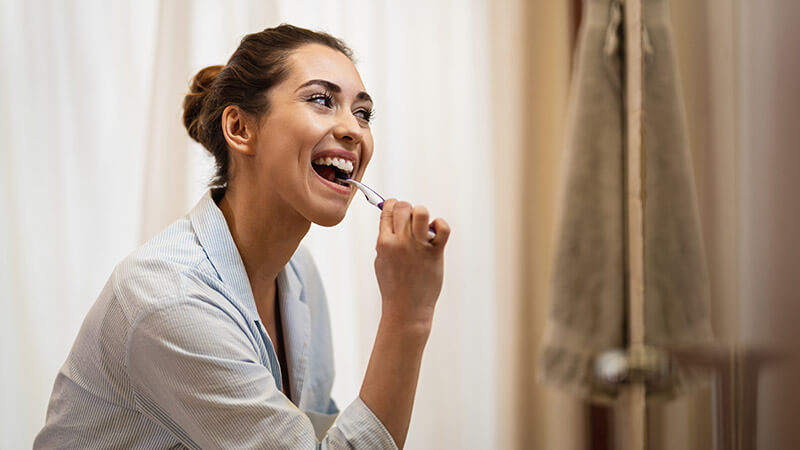Maintaining good oral hygiene is one of the simplest yet most important ways to protect your overall health. In terms of brushing and flossing, understanding the basics can make a big difference in preventing dental problems and keeping your smile healthy. This guide covers everything you need to know to build a strong daily routine and keep your teeth and gums in top condition.
The importance of oral hygiene
Oral hygiene is essential for maintaining a bright smile and supporting overall health and well-being. Regular brushing, flossing, and dental check-ups help prevent common issues like cavities, gum disease, and bad breath, while also reducing the risk of more serious conditions such as heart disease, diabetes, and respiratory infections that have been linked to poor oral health. Keeping the mouth clean minimises harmful bacteria, promotes healthy gums, and preserves natural teeth, making oral hygiene a simple yet powerful way to protect both your dental and general health.
What are the symptoms of poor oral hygiene?
Symptoms can include bad breath (halitosis), red, swollen, or bleeding gums, toothache or sensitivity, visible plaque or tartar buildup, receding gums, and loose or missing teeth. You might also notice a persistent bad taste in your mouth, discolouration or staining on your teeth, and increased cavities or infections. In more severe cases, poor oral hygiene can lead to gum disease (gingivitis or periodontitis), which may cause pus between the teeth and gums, pain while chewing, and even jawbone deterioration if left untreated.
Why is brushing and flossing so vital for improving oral hygiene?
Brushing and flossing work together to remove plaque, food particles, and bacteria that can lead to cavities, gum disease, and bad breath. Brushing cleans the surfaces of your teeth while flossing reaches between them and under the gumline – areas a toothbrush can’t access. Together, they help maintain healthy teeth and gums, prevent dental problems, and support overall health.
What are the best products for brushing?
The following brushing products can help you to maintain excellent oral hygiene:
- Electric Toothbrush – Electric toothbrushes are highly effective at removing plaque thanks to their consistent motion and built-in timers.
- Fluoride Toothpaste – A good fluoride toothpaste is essential for strengthening tooth enamel and preventing cavities.
- Soft-Bristled Toothbrush – Whether manual or electric, a soft-bristled brush is gentler on the gums and enamel while still being effective at cleaning. Hard bristles can cause gum recession or enamel wear over time.
- Toothbrush with a Small Head – A brush with a compact head allows for better access to hard-to-reach areas, such as the back molars and along the gumline.
- Tongue Scraper or Brush with Tongue Cleaner – A toothbrush that includes a tongue-cleaning surface, or a separate tongue scraper, can help remove bacteria that cause bad breath.
What’s best? A manual or electric toothbrush?
Both manual and electric toothbrushes can effectively clean your teeth when used correctly, but electric brushes often have the edge in terms of consistency and ease of use. Electric toothbrushes are designed to deliver thousands of brush strokes per minute, helping to remove more plaque with less effort. Many models include helpful features like built-in timers to ensure you brush for the recommended two minutes, as well as pressure sensors to prevent brushing too hard – something that can damage gums and enamel over time.
That said, a manual toothbrush can be just as effective when used with proper technique and discipline. It offers greater control over brushing motions and doesn’t require charging or batteries, making it a convenient and affordable choice. The key with either option is regular, thorough brushing at least twice a day, combined with good technique and a toothbrush that suits your individual needs, such as one with soft bristles and a comfortable grip. Ultimately, the best toothbrush is the one you’ll use consistently and correctly.
What are the recommended brushing techniques?
Effective tooth-brushing methods include the following:
- Bass Technique – This method involves placing the toothbrush bristles at a 45-degree angle to the gum line and using short, gentle back-and-forth strokes. It’s particularly effective for removing plaque and food particles just below the gum line, helping prevent gum disease.
- Modified Bass Technique – A variation of the Bass Technique, this method adds a sweeping motion after the back-and-forth strokes. After cleaning along the gum line, the brush is rolled away from the gums toward the chewing surface to help clear loosened debris.
- Stillman Technique – Designed for people with gum recession or sensitivity, the Stillman Technique also uses a 45-degree angle, but with the bristles placed partly on the gums and partly on the teeth. Gentle vibrations are applied without too much pressure, helping stimulate the gums and clean along the gum line.
- Charter’s Method – Ideal for those with braces or gum surgery, this technique positions the bristles at a 45-degree angle pointing toward the chewing surface (opposite of the Bass technique). It involves short, circular motions to clean around orthodontic appliances and surgical sites without irritation.
- Fones Technique – Often taught to children, the Fones Technique uses circular motions with the toothbrush placed against the teeth with the jaws closed. It’s simple and easy to learn, making it a good starting point for those new to proper brushing habits.
Why brush twice a day?
Brushing twice a day – morning and night – is essential because it helps remove plaque and food debris that accumulate throughout the day and while you sleep. This routine prevents the buildup of harmful bacteria that can lead to cavities, gum disease, and bad breath. Brushing in the morning freshens your breath and clears overnight bacteria, while brushing at night cleans away the day’s buildup and protects your teeth while you sleep.
Why should I brush my tongue too?
Brushing your tongue is important because it helps remove bacteria, food particles, and dead cells that can build up and cause bad breath. The surface of the tongue has tiny grooves where germs can hide, contributing not only to unpleasant odours but also to plaque buildup on your teeth. Including your tongue in your brushing routine promotes a cleaner mouth and fresher breath overall.
Should I use mouthwash every day?
Using mouthwash every day can be a helpful addition to your oral hygiene routine, but it shouldn’t replace brushing and flossing. Mouthwash can freshen breath, reduce bacteria, and help protect against gum disease and tooth decay – especially if it contains fluoride or antibacterial ingredients. However, it’s important to choose a mouthwash suited to your needs and follow the instructions, as overuse of certain types (like alcohol-based ones) can cause dry mouth or irritation. If you’re not sure about the brand you should be using, arrange a check-up with us and raise the issue with your dentist.
What are the key things to remember when flossing?
Some key tips for improving your flossing:
- Use Enough Floss – Start with about 18 inches of dental floss, winding most of it around your middle fingers and leaving a few inches to work with. This gives you enough clean floss to use a fresh section for each tooth, reducing the spread of bacteria.
- Be Gentle – Slide the floss gently between your teeth using a back-and-forth motion. Avoid snapping it down onto your gums, which can cause irritation or even injury. The goal is to clean, not to forcefully push the floss.
- Curve the Floss – Once the floss is between your teeth, curve it into a C-shape against the side of one tooth. Gently slide it up and down to remove plaque and debris from beneath the gumline and along the tooth surface.
- Don’t Forget the Back Teeth – It’s easy to skip the very back teeth, but they’re just as important as the front ones. Make sure to reach behind your last molars, where food particles and plaque often hide.
- Floss Daily – Consistency is key. Floss at least once a day to keep your gums healthy and prevent plaque buildup between teeth that your toothbrush can’t reach. Making it part of your routine ensures long-term benefits for your oral health.
What should I do if I struggle with the tape flossers?
For those who find traditional tape flossers difficult to use, several effective alternatives can make flossing easier and more comfortable. Floss picks, which are small plastic tools with a short strand of floss, offer better control and are especially helpful for people with limited dexterity. Water flossers, like Waterpiks, use a gentle stream of water to clean between teeth and along the gum line, making them a great option for individuals with braces or sensitive gums. Soft picks and interdental brushes are also excellent choices – they’re gentle, easy to use, and come in various sizes to fit different gaps between teeth.
What are common mistakes to avoid?
Common issues include skipping flossing altogether, using the same section of floss between multiple teeth, and snapping the floss into the gums, which can cause injury. Many people also rush through flossing or only do it occasionally, reducing its effectiveness. Another frequent error is not curving the floss around each tooth to clean beneath the gumline properly. To get the most benefit, floss gently, use a clean section for each tooth, and make it a daily habit as part of your oral hygiene routine.
Concerned about your oral hygiene?
At Gallions Reach Dental Clinic, our expert team has served over 170,000 patients in the Greenwich area of South-East London across our 30-year history. If you’re based in London or the South-East, and you’re concerned about an oral hygiene matter, arrange a time for a check-up with us today by visiting our contact page.
BDS (Lon), DPDS (Bris), D Imp Dent RCSEd, DwSi
GDC: 73460
Born in 1974 in Brentwood, Essex, Daniel ‘always wanted to be a dentist’ and proudly qualified from The Royal London Hospital in 1997. He has worked at Gallions Reach since 2001. His hobbies include running marathons and recently (unsuccessfully) attempting to swim the English Channel. A season ticket holder at Upton Park, Daniel keenly follows the ups and (mainly) downs of West Ham United!



